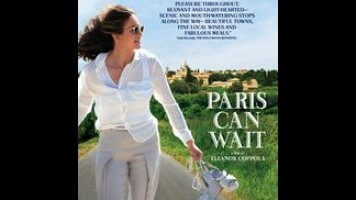With Paris Can Wait, Eleanor Coppola takes viewers on an endless, tedious vacation

Professional groove reclaimant Diane Lane is at it again. After decamping for Tuscany and falling out and in love with Richard Gere, Lane rejoins her exploration of life’s many paths toward revitalization in Paris Can Wait, which imagines the process as something very much like tourism. Anne (Lane) is in Cannes with her husband, Michael (Alec Baldwin), a film producer, and when they’re about to fly to Budapest via private jet, Anne is grounded because of a bad earache, a condition that the semi-neglectful Michael has failed to register (and one that, somewhat awkwardly, a member of the flight crew notices and diagnoses within 30 seconds of meeting her). Michael’s associate Jacques (Arnaud Viard) volunteers to drive Anne to Paris, where she and Michael will meet in a few days.
Starting with his name, Jacques could hardly be more of a French archetype: He smokes, he flirts, he savors great food, he starts sentences with “you Americans,” and he’s in no particular hurry to get anywhere, including his stated destination. During what should be about an eight-hour drive, he insists on stopping at fancy restaurants, then historical sights, then a fancy inn; later, more fancy restaurants. Anne protests, but mostly just lightly. Over dinners, lunches, and a few museum tours, they get to know each other, and Anne clearly comes to relish a degree of attention she does not receive from her husband. Is this something more than a temporary alliance between a white-and-beige-clad passenger and her chauffeur of vague actual job title?
Viard does defy American stereotypes about Frenchmen by removing from Jacques most signs of condescension; he plays the part with kind eyes and an even temperament, and it’s easy to see why Anne finds his company agreeable. It’s less easy to see why writer-director Eleanor Coppola, making her fiction debut after years of documentary experience (often in the form of making-of materials related to the films of her husband, Francis Ford Coppola), finds Anne or Jacques especially interesting as subjects of a feature film. They rarely offer much in the way of observation, insight, or opinion (Anne’s secret passion: She loves chocolate! Ack!), which is usually the signal for a talented performer like Lane to take over and fill the gaps in the writing.
But Coppola doesn’t seem any better with actors than she is with words, because Lane works from a limited bag of tricks here, like repeatedly cocking one eyebrow and rapidly moving from polite to devastated for the movie’s late-breaking emotional backstory. (She also gets to plug the filmmaker’s son-in-law’s lame band.) There simply isn’t any way to skip through the movie’s shoddy construction, especially its rickety treatment of the dialogue that’s supposed to be its foundation. Coppola gives each line too much space, as if luxuriating in the way that actions as simple as refusing and then accepting a glass of wine can come across as utterly stilted. The movie obviously intends to send the audience on a trip along with its characters, indulging in food-porn close-ups of meals and wineglasses. But its tourism is second-tier Linklater by way of Nancy Meyers reading a Zagat guide aloud.
The relentless on-paper pleasantries of Paris Can Wait even become, with time, near maddening. This movie pays the most attention to the tedium of upper-class foibles since perhaps Lawrence Kasdan’s Darling Companion, and as with that disaster, even the heartfelt details are bizarre contrivances. The screenplay illustrates Anne’s distance from Michael by revealing that she never lets him look at her photography and he never presses her on the issue—which essentially amounts to him never expressing more than passing interest in decades of family vacation photos. Maybe it would make more sense if Anne’s photos were more than point-and-shoot dalliances; they only look a little snazzy in contrast with the movie’s actual cinematography, faded and overcast in that familiar digital way. On some level, Coppola seems to understand that her main event isn’t much to look at; she cuts away to beautiful scenery, Anne’s middling snapshots, and the odd piece of real art in a manner that suggests a movie halfheartedly spiced up in post with extra PowerPoint slides.
There’s a lot of power in the notion of a possibly fleeting circumstantial romance—enough, Coppola must have thought, to power Paris Can Wait past any threats of banality. But as lovely as it is to think about how two people can spark simply from talking and eating together, that doesn’t mean anyone will want to eavesdrop on the conversation, or marvel at their impeccably plated food. As the movie pulls over to look at museum fabrics in vain search of a groove, it turns the audience into its impatient child, threatening to start kicking the back of the car seat any minute now.